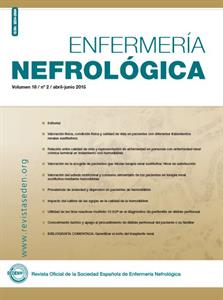Contenido del artículo principal
Resumen
Introducción: Paciente y familiar deben conocer los conceptos esenciales y poseer habilidades motoras para la realización de diálisis peritoneal continua ambulatoria, por esto, enfermería brinda educación al paciente y familiar sobre los cuidados de diálisis en el hogar, sin embargo, continúan acudiendo pacientes con alguna complicación al hospital.
Objetivo: Determinar el nivel de conocimiento teórico y apego al procedimiento dialítico del paciente o familiar.
Metodología: Se realizó un estudio descriptivo. Se efectuó una visita domiciliaria, en donde se aplicaron: una lista de cotejo para evaluar el apego al procedimiento, un cuestionario para evaluar los conocimientos teóricos y una cédula de variables clínicas y sociodemográficas. Participaron 24 sujetos, se dividieron en grupo pacientes (GP), donde los pacientes se auto-realizan el procedimiento y familiar (GF), donde los familiares realizan la técnica.
Resultados: El nivel de conocimiento teórico en general fue moderado (73.24%), el GP obtuvo un índice más elevado (75.35%) que el GF (71.45%). En la técnica, en general, se adhirieron al 80.3% de los pasos, el GF obtuvo mayor índice correcto (81.92%) que el GP (78.63%).
Conclusión: Los pacientes y familiares demuestran un déficit en ambas áreas, por esto, es necesario evaluarlos periódicamente para detectar fallos en la técnica y en el conocimiento, que predispongan al paciente a una complicación prevenible.
Objetivo: Determinar el nivel de conocimiento teórico y apego al procedimiento dialítico del paciente o familiar.
Metodología: Se realizó un estudio descriptivo. Se efectuó una visita domiciliaria, en donde se aplicaron: una lista de cotejo para evaluar el apego al procedimiento, un cuestionario para evaluar los conocimientos teóricos y una cédula de variables clínicas y sociodemográficas. Participaron 24 sujetos, se dividieron en grupo pacientes (GP), donde los pacientes se auto-realizan el procedimiento y familiar (GF), donde los familiares realizan la técnica.
Resultados: El nivel de conocimiento teórico en general fue moderado (73.24%), el GP obtuvo un índice más elevado (75.35%) que el GF (71.45%). En la técnica, en general, se adhirieron al 80.3% de los pasos, el GF obtuvo mayor índice correcto (81.92%) que el GP (78.63%).
Conclusión: Los pacientes y familiares demuestran un déficit en ambas áreas, por esto, es necesario evaluarlos periódicamente para detectar fallos en la técnica y en el conocimiento, que predispongan al paciente a una complicación prevenible.
Palabras clave
diálisis; conocimiento y apego.
Detalles del artículo
Licencia
Aviso de derechos de autor/a
© Los autores ceden de forma no exclusiva los derechos de explotación de los trabajos publicados y consiente en que su uso y distribución se realice con la Licencia Creative Commons Atribución - No comercial 4.0 Internacional (CC BY-NC 4.0). Puede consultar desde aquí la versión informativa y el texto legal de la licencia. Esta circunstancia ha de hacerse constar expresamente de esta forma cuando sea necesario.
Cómo citar
1.
García Meza WJM, Carrillo Cervantes AL, Villarreal Reyna M de los Ángeles, Delabra Salinas MM. Conocimiento teórico y apego al procedimiento de diálisis peritoneal del paciente o su familiar. Enferm Nefrol [Internet]. 2015 [consultado 26 Sep 2025];18(2):[aprox. 7 p.]. Disponible en: https://www.enfermerianefrologica.com/revista/article/view/3994




